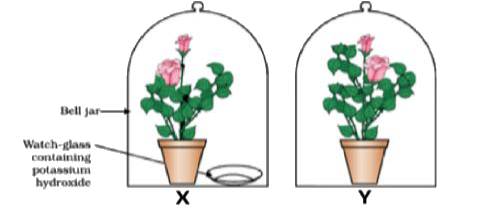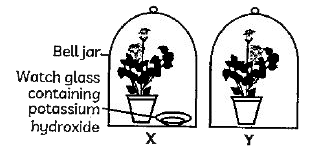Read the given paragraph.
Photosynthesis in plants consists of two phases: X and Y. Phase X requires light energy and occurs in granum of chloroplast whereas phase Y is light independent and occurs in stroma of chloroplast. Which of the following holds true regarding phases X and Y of photosynthesis?
In phase X, light energy is used up in photolysis of water and molecular oxygen is evolved.
In phase Y, electrons and protons are used up in synthesis of assimilatory power.
Assimilatory power generated in phase Y is used up in phase X to convert CO2 into carbohydrates.
Phase X utilises carbon dioxide gas of atmosphere whereas phase Y evolves oxygen gas that escapes into atmosphere.
The correct Answer is:A
Step-by-Step Solution:
1. Understanding Photosynthesis:
- Photosynthesis is the process by which plants convert light energy into chemical energy, producing food (glucose) and oxygen as by-products.
- It consists of two main phases: the light-dependent reactions (Phase X) and the light-independent reactions (Phase Y).
2. Identifying the Phases:
- Phase X (Light Phase):
- Requires light energy.
- Occurs in the granum (stacks of thylakoids) of chloroplasts.
- In this phase, water (H2O) is split (photolysis) to release oxygen (O2) and generate energy carriers like ATP and NADPH.
- Phase Y (Dark Phase):
- Does not require light (light-independent).
- Occurs in the stroma of chloroplasts.
- Utilizes ATP and NADPH produced in Phase X to convert carbon dioxide (CO2) into glucose.
3. Analyzing the Options:
- The question asks which statements hold true regarding phases X and Y of photosynthesis.
- Based on the definitions and processes of both phases, we can evaluate the provided options.
4. Evaluating Each Option:
- Option A: Correct. Phase X uses light energy to split water and release oxygen.
- Option B: Incorrect. Electrons and protons are generated in Phase X, not Phase Y.
- Option C: Incorrect. Assimilatory power (ATP, NADPH) is generated in Phase X and used in Phase Y.
- Option D: Incorrect. Phase X does not utilize carbon dioxide; it releases oxygen.
5. Conclusion:
- The correct answer regarding the phases of photosynthesis is Option A.
- Photosynthesis is the process by which plants convert light energy into chemical energy, producing food (glucose) and oxygen as by-products.
- It consists of two main phases: the light-dependent reactions (Phase X) and the light-independent reactions (Phase Y).
- Phase X (Light Phase):
- Requires light energy.
- Occurs in the granum (stacks of thylakoids) of chloroplasts.
- In this phase, water (H2O) is split (photolysis) to release oxygen (O2) and generate energy carriers like ATP and NADPH.
- Phase Y (Dark Phase):
- Does not require light (light-independent).
- Occurs in the stroma of chloroplasts.
- Utilizes ATP and NADPH produced in Phase X to convert carbon dioxide (CO2) into glucose.
- The question asks which statements hold true regarding phases X and Y of photosynthesis.
- Based on the definitions and processes of both phases, we can evaluate the provided options.
- Option A: Correct. Phase X uses light energy to split water and release oxygen.
- Option B: Incorrect. Electrons and protons are generated in Phase X, not Phase Y.
- Option C: Incorrect. Assimilatory power (ATP, NADPH) is generated in Phase X and used in Phase Y.
- Option D: Incorrect. Phase X does not utilize carbon dioxide; it releases oxygen.
- The correct answer regarding the phases of photosynthesis is Option A.
Topper's Solved these Questions
- NSO QUESTION PAPER 2016 SET ABook:SCIENCE OLYMPIAD FOUNDATION Chapter:NSO QUESTION PAPER 2016 SET AExercise:Achievers Section
Explore 2 Videos
- LIFE PROCESSESBook:SCIENCE OLYMPIAD FOUNDATION Chapter:LIFE PROCESSESExercise:ACHIEVERS SECTION (HOTS)
Explore 5 Videos
- NSO QUESTION PAPER 2016 SET B Book:SCIENCE OLYMPIAD FOUNDATION Chapter:NSO QUESTION PAPER 2016 SET B Exercise:Achievers Section
Explore 2 Videos
Similar Questions
Light-independent reactions of photosynthesis occur in thylakoids/stroma of chloroplast.
View SolutionThe Figure shown below represents an activity to prove the requirements for photosynthesis. During this activity, two healthy potted plants were kept in the dark for 72 hours. After 72 hours, KOH is kept in the watch glass in setup X and not in setup Y. Both these setups are air tight and have been kept in light for 6 hours. Then, Iodine Test is performed with one leaf from each of the two plants X and Y.

This experimental set up is used to prove essentiality of which of the following requirements of photosynthesis?
View Solution
Knowledge Check
Which of the following is produced during the light phase of photosynthesis?
AATPBNADPH_(2)CBoth ATP and NADPH2DCarbohydratesWhich of the following occures during dark phase of photosynthesis ?
AHydrogen is releasedBATP is producedCMolecular oxygen is releasedDPGAL is synthesizedCase : The Figure shown below represents an activity to prove the requirements for photosynthesis. During this activity, two healthy potted plants were kept in the dark for 72 hours. After 72 hours, KOH is kept in the watch glass in setup X and 'not in setup Y. Both these setups are air tight and have been kept in light for 6 hours. Then, lodine Test is performed with one leaf from each of the two plants X and Y.

This experimental set up is used to prove essentiality of which of the following requirements of photosynthesis?AChlorophyllBOxygenCCarbon dioxideDSunlight
Two different species of plants X and Y live together as if they are parts of the same plant Z. The plant X is an autotroph whereas plant Y is a saprophyte . The plant Y holds the cells of X in its mat of web-like hyphae and supplies water and minerals to cells of plants X . the plant X makes food by photosynthesis and shares it with plant Y
Which of the two plants, X or Y, is green in colour ?
View SolutionTwo different species of plants X and Y live together as if they are parts of the same plant Z. The plant X is an autotroph whereas plant Y is a saprophyte . The plant Y holds the cells of X in its mat of web-like hyphae and supplies water and minerals to cells of plants X . the plant X makes food by photosynthesis and shares it with plant Y
What is the relationship exhibited by plants X and Y known as ?
View SolutionTwo different species of plants X and Y live together as if they are parts of the same plant Z. The plant X is an autotroph whereas plant Y is a saprophyte . The plant Y holds the cells of X in its mat of web-like hyphae and supplies water and minerals to cells of plants X . the plant X makes food by photosynthesis and shares it with plant Y
What could plants Y be?
View SolutionTwo different species of plants X and Y live together as if they are parts of the same plant Z. The plant X is an autotroph whereas plant Y is a saprophyte . The plant Y holds the cells of X in its mat of web-like hyphae and supplies water and minerals to cells of plants X . the plant X makes food by photosynthesis and shares it with plant Y
What could plants X be?
View SolutionTwo different species of plants X and Y live together as if they are parts of the same plant Z. The plant X is an autotroph whereas plant Y is a saprophyte . The plant Y holds the cells of X in its mat of web-like hyphae and supplies water and minerals to cells of plants X . the plant X makes food by photosynthesis and shares it with plant Y
What could plants Z be?
View Solution